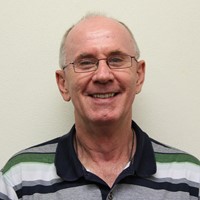While holes exist, they don’t have any substance. They are actually defined by the substance they are not, by what is substantial around them.
(I could be silly and wax on about every hole being a whole hole – but I won’t.)
A hole has impact precisely through its nothingness. Fall down a hole in the ground to realise how devastating what isn’t there is to your wellbeing (although it’s what is there at the bottom that hurts!).
The celebrated “hole in the bucket” meant that dear Liza’s container couldn’t hold water. The hole was the absence of an integral part of the bucket, rendering it useless for its intended purpose.
Consider another scenario. Imagine someone lasered the Mona Lisa’s nose, disintegrating the paint and canvas, leaving a well defined hole. We wouldn’t say “Oh, that’s nothing!” even though it is! That newly imposed nothing would be devastating because we value the something – the wholeness – that used to be there.
Why prattle on about holes? Why talk of holes being nothing yet having real impact?
It’s because the concept of the hole provides a way to understand that difficult and challenging topic of evil and sin.
In a world created by a good God, I believe evil and sin can be well understood as what isn’t there that should be – holes in God’s good creation.
This is my train of thought. Christians believe that God is good and creates everything good. Evil and sin is not created by God. In fact it is not “created” at all. It is not created by humans nor by any imagined evil being or force. Like a hole, evil and sin is merely an absence, the absence of what is good. And that absence has devastating consequences.
The evil of our sins is the absence of goodness and love that should be there. Sinning is choosing not to love. This hole in loving impacts negatively on those who should receive our love, just as any decision to love contributes to their good.
Killing, adultery, stealing and their various sinful siblings are all failures to do good and to love. Some are gross failures with dire outcomes, others are on a reducing scale of seriousness – more or less significant holes in the fabric of our love-life.
In every decision to sin we firstly take from our integrity, leaving a hole in our own wholeness. Sin is always self-depletion. It creates a hole in our own goodness and love which is our very essence, made, as we are, in God’s image and likeness.
Love has real substance in all its many manifestations – kindness, patience, empathy, generosity, respect, truthfulness, faithfulness, endurance, compassion, tenderness, etc, etc. All these are substantial, building up and enriching self and others.
Evil and sin is also real, but without substance, and has its impact by its negation or rejection or denial or withholding or reduction of the variegated forms of love and goodness.
In the penitential rite in Mass we say “I confess…that I have sinned…in what I have failed to do”. We undertake the uncomfortable and demanding task of acknowledging the “nothings” I am choosing – the holes in my humanity. It is challenging.
It is not sufficient to ask “have I crossed the line and done something I shouldn’t have?” Perhaps more maturely and constructively I ask “How have I chosen not to love? Where have I settled for no love, or less love, instead of the love required? Where are the holes in my loving?”
This fits well, I suggest, with a mature appreciation of love’s nemesis, sin. The sin of the goats on Christ’s left in Matthew’s Final Judgement scene was solely a failure to love – an un-godly absence of love in action: “I was hungry and you gave me no food”. Love should have been there, doing good. “You didn’t do bad, you just didn’t do good. I needed your love, but you chose not to love”.
So ultimately what am I saying? That sin and evil is real and impacts us – as holes rather than any thing of substance. Something essential is missing. Integrity is compromised. To the extent that love in its many expressions isn’t there, I am sinful. There is a hole in my very self, in my relationship with God and with others.
We instinctively balk at saying “I am a sinner”. However, to say it is not to say that’s all I am. It acknowledges holes in my goodness and loving. It says that I am a good person not wholly good, a lover who does not love as whole-heartedly as I should. Not yet.
Holes in my relationship with God and with others – my sins – need to be filled with love for wholeness and holiness.
No holes in heaven, only the wholeness of love – complete holiness!
Aurora Extra - when 24 pages a month just isn't enough.























































































